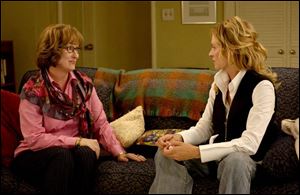
Movie review: Prime ***
10/28/2005
Meryl Streep, left, plays a therapist treating a patient (Uma Thurman) with a fear of intimacy.
It's obnoxious and misleading how TV commercials and movie trailers are selling Prime, the Meryl Streep-Uma Thurman comedy.
The marketing behind this wise little film about a May-December fling does it a massive disservice, starting with the title - it's too serious, too easily confused with Proof, or the Sundance picture Primer, or worse, with yet another psychological thriller, perhaps about a serial killer obsessed with math who strikes on the 2nd, 3rd, 5th, 7th, 11th, 13th, 17th, 19th, 23rd, or 31st of the month - and every four years on the 29th of February. Prime contains no calculus.
Instead, the title refers to either the peak of one's sexual prime, or to that moment in life (that prime of life) when one feels most alive. (Or it refers to both.) The title is not without its poignancy (especially later when you wonder about it), but it's also the only oblique thing about Prime - directed by Ben Younger, who made the underrated Boiler Room, and who, here, makes the sunniest Woody Allen movie in quite a while that Allen had nothing to do with.
What Younger hasn't made, what the title doesn't refer to, is the movie you've seen advertised: a shrill feminine variation on Meet the Parents (go figure; both films are from Universal) with the Robert De Niro role played by Streep and the Ben Stiller part played by Thurman and a plot that revolves around a therapist (Streep) treating a patient with a fear of intimacy (Thurman) who subsequently loses that fear when she dates the therapist's son (Bryan Greenberg, of One Tree Hill), unbeknownst to shrink or shrinkee.
That is one complication, and it pays off in surprisingly smart ways. There are, however, one or two too many complications for Prime to be as extraordinary as it keeps promising.
What the film is about, however, is far more simple to explain: a 37-year-old photo editor (Thurman) finds herself in love with a 23-year-old painter (Greenberg) who lives with his kvetching grandparents on the Lower East Side.
It's also about that feeling of weightlessness when a relationship is new, and the roadblocks that often get in the way.
Those roadblocks, by the way, do not involve a toilet-trained cat or a lie detector, as were used in Meet the Parents.
A few of the characters may be broad but not in the ways they respond. Pay attention, for instance, to the way Younger doesn't rush the story into a confrontation over parents.
A lot of the film is just the normal cycle of meet and mate: Rafi (Thurman) meets David (Greenberg) through a mutual friend; like a lot of New Yorkers, they meet while standing in a line. He calls her one night. Hangs up without saying anything. Calls back. She asks if he just called. He pauses, admits he did, and asks her to go out for dinner. She reports back to her therapist that she is doing just fine.
He reports to his mother (her therapist) that he is seeing this woman, and no, she is not Jewish. She is a classic shiksa, tall and blond and gorgeous and probably from Connecticut, too.
So, faith is a roadblock. "I think religion is paramount in a person's life," is how Lisa (Streep) responds to the news of her son's new girlfriend, even before she knows who the girlfriend is. But her children have long stopped caring: David is at that age where he's adopted his parent's religion but goes through the motions.
Younger is smart not to make too much of this or trivialize it. And after Lisa learns who David's girlfriend is, Lisa is so horrified it takes her a session or two before she can even tell Rafi that David is her son. It raises a lot of ethical red flags with the audience but, as in an Allen movie, seems possible.
Also, despite how generic the movie looks (Younger is not an expressive filmmaker), it avoids the obvious, and even shakes off that shrink-patient thing, and the interfaith relationship problem, for a larger issue: age difference.
So much of what happens to Rafi, David doesn't exactly understand. He's not a bad guy for not understanding. He's just not there yet. Thurman is radiant as a woman coming into her own. Streep is a bit of a Jewish mother caricature, but Greenberg, who generates real heat with Thurman, manages to appear both mature enough for an older woman while conveying small, nagging hints he might not be.
This is Allen real estate, albeit without the small, nagging hints: The characters here live a life of hip hop and foreign movies, of nice restaurants and cheap ones, and house parties that aren't necessarily in winding upper-class apartments.
Prime, in other words, is a rare New York picture. It gets the casualness of the city, the strolling, just as prevalent as the hustle, but less publicized. Part of the reason: It was made in New York, and not that store-brand version called Toronto - it's authentic.